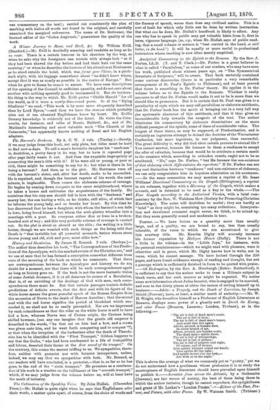Analytical Commentarg on the Epistle to the Romans. By the
Rev. J. Forbes, LL.D. (T. and T. Clark.)—Dr. Forbes is a great believer in what is called "Parallelism," as some of our readers, who may have seen his work, published about sixteen years ago, on "The Symmetrical Structure of Scripture," will be aware. That book certainly contained some curious discoveries (there is in particular a very remarkable arrangement of St. Paul's Epistle to Philemon), and at least proved that there is something in Dr. Forbes' theory. He applies it in the volume before us to the Epistle to the Romans. Whether it really amounts to all that Dr. Forbes would make it out to be is more than we should like to pronounce. But it is certain that St. Paul was given to a peculiarity of style which we may call parallelism or elaborate antithesis, that Dr. Forbes' book has the merit of bringing out in a very full way the systematic character of this antithesis, and that it thus gives no inconsiderable help towards the exegesis of the text. The author illustrates his commentary by elaborate dissertations on the more difficult passages of the epistle, some of them of considerable value. The of these treats, as may be supposed, of Predestination, and is certainly an ingenious attempt to defend the doctrine of the Westminster Confession, but more ingenious, in our judgment, than successful. The great difficulty is, why did God elect certain persons to eternal life ? You cannot answer, because He foresaw in them a readiness to aocept the offer of salvation, because that would be to attribute a certain merit to the creature which, according to orthodox creeds, ought not to be so attributed. "No," says Dr. Forbes, "but He foresaw the non-existence of that obduracy which differentiates the reprobate." If Dr. Forbes can see any real distinction between " readiness " and non-existence of obduracy, we can only congratulate him in hopeless admiration on his acuteness. —In the same connection we may mention a reprint of Mr. Isaac, Williams' Devotional Commentary on the Gospels (Rivingtons), a reprint in six volumes, together with a Harmony of the Gospels, which makes a seventh, and is intended to be used as a key to the whole.—The Four Gospels according to the Authorized Version, with a brief com- mentary by the Rev. W. Walsham How (Society for Promoting Christian Knowledge). The notes will doubtless be useful ; they are hardly as "brief" as they might be, containing too many reflections. Interpreta- tion and devotional comment ought never, we think, to be mixed up.. But they seem generally sound and moderate in tone.






























 Previous page
Previous page